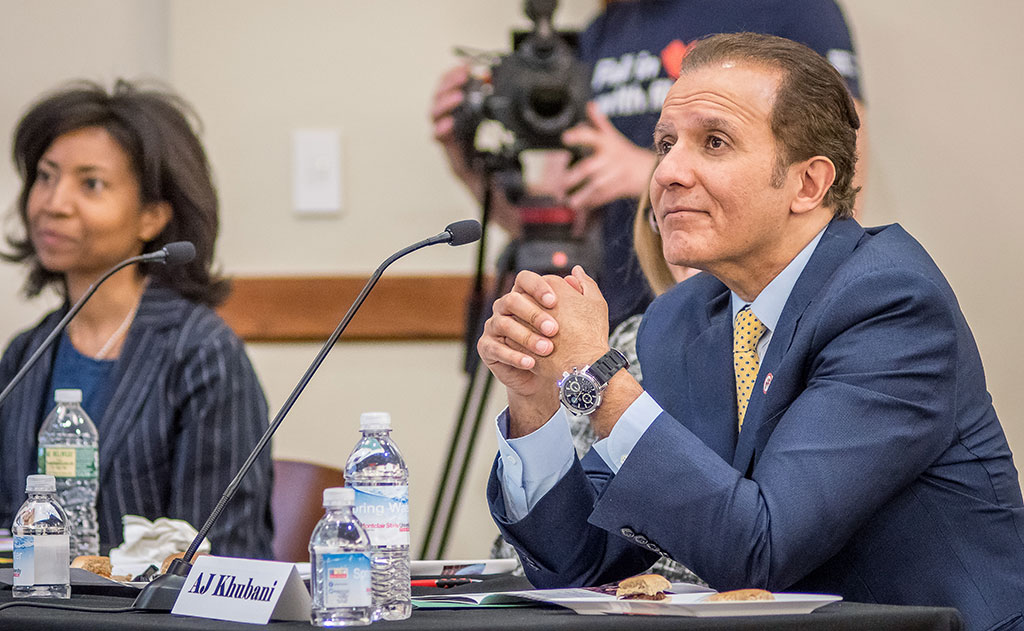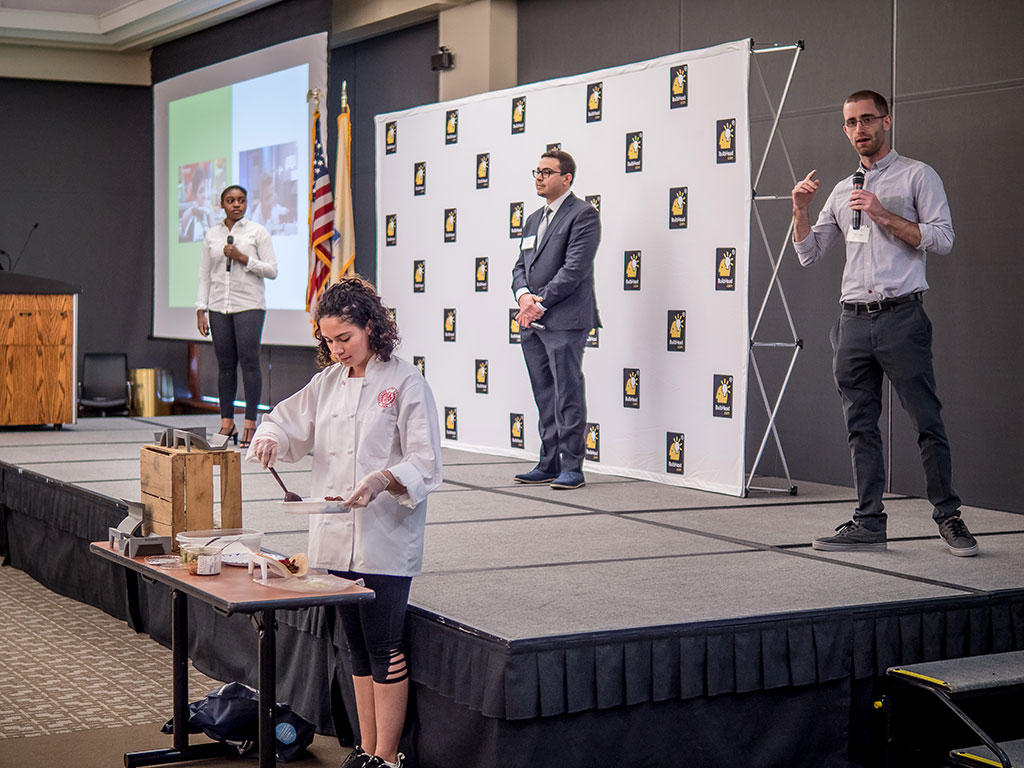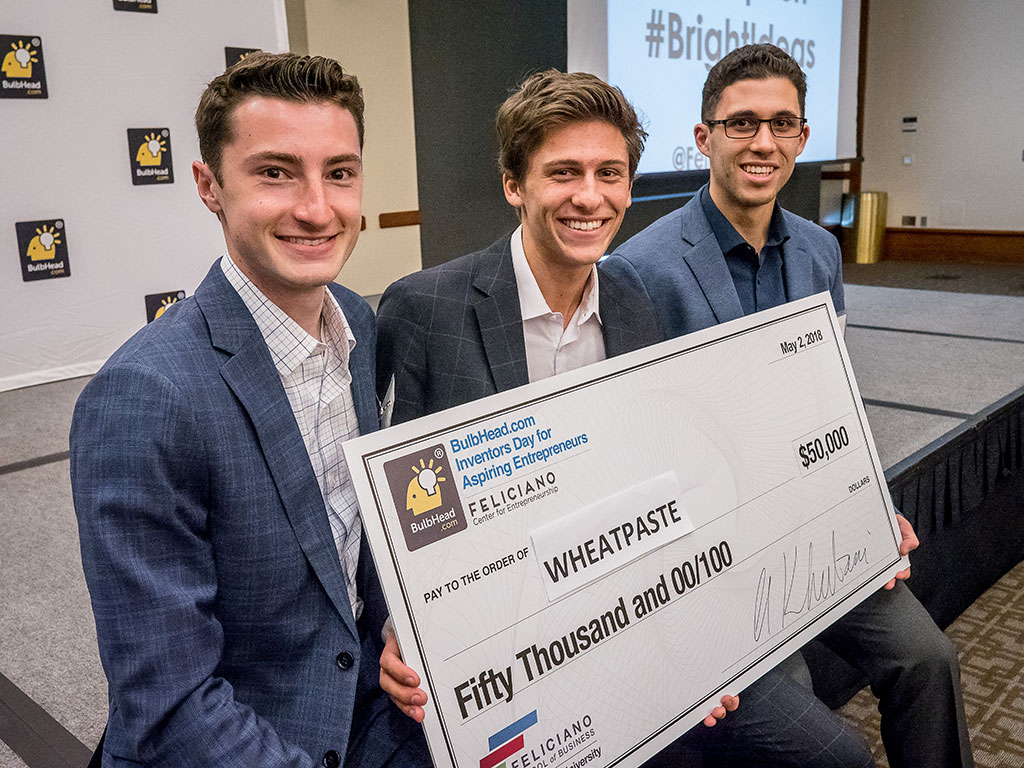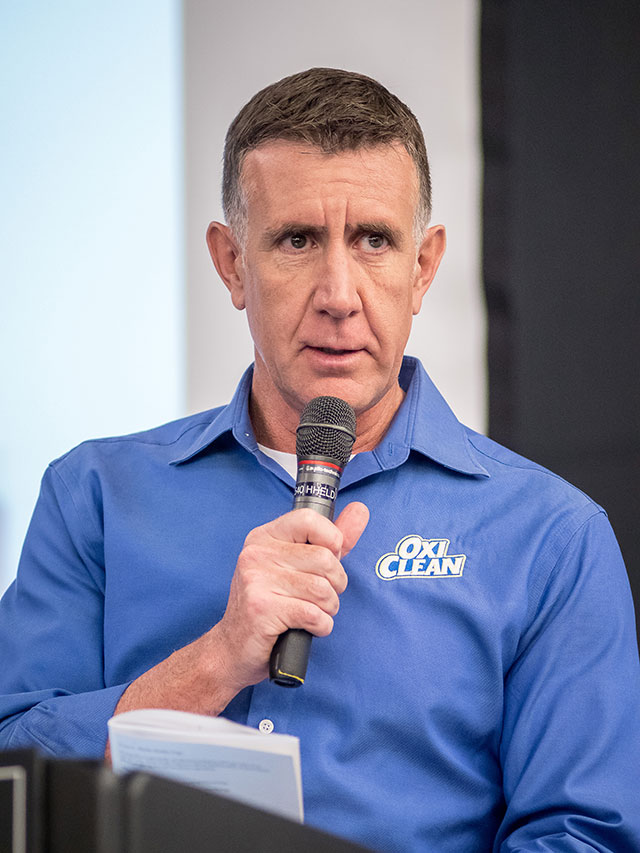
Big Ideas
Student startups compete for New Jersey’s largest collegiate prize pool at Bulbhead.com Inventors Day
The next big thing might just be taking shape on campus inside the University’s Feliciano Center for Entrepreneurship. Student startups are booming, boosted in part by a chance to win part of New Jersey’s richest collegiate prize pool for promising business ideas. With $80,000 donated this year by alumnus AJ Khubani, CEO and founder of BulbHead.com, Montclair State’s Shark Tank-inspired contest gave student ventures a chance to test the waters with their killer investment pitches.
As the May competition dawned, David McDougall, a senior Business Management major, was picking up a fresh batch of ingeniously shaped 3D-printed kitchen gadgets that “roll a better burrito.” The emcee for the Montclair State competition was a popular pitchman, and the Rollarito, the name McDougall and his partners have given the quirky cooking tool, was just the type of thing OxiClean’s Anthony “Sully” Sullivan spins on TV.
But first they’d have to convince Khubani and a panel of judges at the BulbHead.com Inventors Day for Aspiring Entrepreneurs. It’s not exactly sink or swim. The University provides plenty of resources, from networking opportunities with alumni to professors’ expertise to help students turn their passions into profits. Specialized classes and facilities like the MIX Lab with 3D printing for innovation and digital design are helping students fully develop and test their ideas. The University also offers a certificate in entrepreneurship, which teaches the real-life skills needed to launch a successful enterprise. And with the pitch contest’s reach across campus, students draw on each other’s expertise, whether it’s business or graphic arts, computer science or psychology.

In a back hallway, Sirawar Matin, a sophomore majoring in Athletic Training, was nervously rehearsing his carefully crafted script with Iffat Siddiqi, a junior Computer Science major. It was a childhood memory of sock “skating” over wooden floors that had brought them to the finals at Montclair State. “What would happen if you could walk and slide and clean the house at the same time?” they wondered.
The friends had reason to hope they could clean up in the contest. A few weeks earlier, they placed third among state universities and colleges in UPitch New Jersey, where their company, Neatsweeps, also won the Audience Choice Award. For the BulbHead pitch, they upped the “cute” factor, inviting a pair of young boys in slippers to slide around the stage.
Facing the panel who will decide if your idea is worthy of investment is one of the most critical – and terrifying – moments for any entrepreneur. At Montclair State, more than 300 people viewed the finals on May 2 in University Hall. The students presented their ideas, product samples and PowerPoint presentations to entrepreneur experts, including Khubani, a 1984 graduate who has invested in Montclair State’s business program, substantially increasing the prize money this year.

Khubani has firsthand experience in student startups, launching his own career as an entrepreneur while at Montclair State. He has since built direct-response marketing into “As Seen on TV” TeleBrands and its online marketplace BulbHead.com.
“You remind me of where I was 35 years ago when I first started,” he told the contestants.
A few days before the competition, the partners in Eatree, an idea for a healthy fast-food chain, set up a stand at a local lacrosse game, selling vegan burgers they grilled on a camper’s stove to parents watching their children play. At the pitch, the gumption paid off as the group showed confidence batting away questions on marketability, strategy and finances – and winning $20,000 to continue testing its recipes. “It took skill to think through the nervousness,” says Lauren Wisnewski, a senior Visual Communication Design major.
We look at the pitch prizes as investing in companies just as startup investors do... They may have a terrific concept, but they need money to strengthen and grow their business model.
Tech-savvy teams incorporated apps to enhance their products. The Neatsweeps slippers, for instance, were boosted with augmented reality to entertain and encourage children to clean up virtual dust bunnies as they sweep up real dust by sliding on floors inside their homes. While high on the cool factor, the judges, after deliberation, were lukewarm.
“We thought about what each team could do with the money,” Khubani says. “Could they really get to market, how sellable is the idea, how unique is the idea?”
The winning pitch came from Wheatpaste, a digital advertising and community platform for small businesses. The startup takes its name from the mix-it-yourself paste advertisers use to plaster their messages on fences. With an easy-to-use app for small businesses to design, post and push out ads, coupled with community news and events, Wheatpaste is envisioned as the “glue that holds a community together,” says George Garcia, a senior Business Administration major who is slated to be one of Montclair State’s first graduates in the new entrepreneurship concentration.

Garcia with teammates Matthew Szot, a senior Applied Nutrition major, and Jacob Gilbert, a junior Psychology major, were awarded $50,000 to continue developing their app. They plan to launch in Randolph, New Jersey, where Garcia has experience working with small businesses as a member of the township’s Economic Development Committee.
“They had a great pitch,” says Information Management and Business Analytics Professor Ross Malaga. “They are tackling a big problem facing many small businesses. Plus, they developed an interesting solution that will hopefully lead to greater community engagement and advertising opportunities for local businesses.”
Third place went to an ethical clothing startup called Culture that will create opportunities for the workers making the garments. Culture, headed by Kent Daniel, a senior Management major, and Sasha Mejia-Rivas, a junior Fine Arts, Photography major, received $10,000 to continue website and product development. Daniel has experience in launching such a business. He worked as a designer in the clothing industry for 25 years before the economic downturn, coming to Montclair State seven years ago as transportation supervisor. “My experience as a University employee and student has created the opportunity for me to reinvent myself,” he says. His startup plans to give back, “one stitch at a time,” through profit sharing and foundation support.

At each prize level, team members will share 20 percent of the award, with the remaining 80 percent to be invested in the venture under the coaching of the Feliciano Center for Entrepreneurship.
“We look at the pitch prizes as investing in companies just as startup investors do,” says Dennis Bone, the Center’s director. “The reason we raised the money to expand the prizes is to address one of the biggest challenges facing startups, which is securing funding, especially for early-stage startups that haven’t yet generated a lot of traction. They may have a terrific concept but they need money to strengthen and grow their business model.”

For Rollarito, despite its “As Seen on TV” appeal, the difficulty of rolling burritos just didn’t resonate with all the judges as a universal problem. “You have to make (the need for the gadget) huge,” Sullivan, the British entrepreneur and pitchman, advised the team.
“It was definitely disappointing and surprising we didn’t win something based on the reaction we received after we pitched,” says Will Krupka, a senior Business Management major.
But rejection, while frustrating, often leads to future success. “You can’t use that as a premonition of what your path or journey will be because you have to fail in order to win,” semifinal judge and alumna Hakika DuBose, founder and CEO of Kika Stretch Studios, told the contestants. “And really, failing is not failing, it’s just a lesson learned.”
Or as Sullivan put this part of the entrepreneurial process: “Embrace the suck. Embrace the failure.”
Rollarito may not need to embrace it for long. The day after the pitch contest, one of the judges reached out expressing interest in possibly investing. “We still need to schedule a meeting and go through our strategy,” Krupka says. “Nothing is set but this is at least hope that we can move forward.”